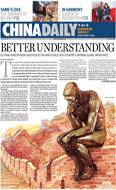Politics
Why the US had it wrong about bin Laden's hideout
Updated: 2011-05-05 10:15
(Agencies)
WASHINGTON - The dramatic raid on Osama bin Laden's compound in a Pakistani town this week capped a decade-long manhunt, but it also revealed just how wrong the US had been about where the world's most wanted terrorist was hiding.
Time and again, the nation's top national security officials told each other and the world that their best intelligence suggested that bin Laden was living along the mountainous, ungoverned border of Pakistan and Afghanistan.
"I have an excellent idea of where he is," CIA Director Porter Goss said in 2005.
"I believe he is in the tribal region of Pakistan," Director of National Intelligence Mike McConnell said in July 2007.
"All I can tell you is that it's in the tribal areas. That's all we know, that he's located in that vicinity. The terrain is very difficult. He obviously has tremendous security around him," CIA Director Leon Panetta said in June 2010.
In reality, bin Laden was living comfortably in the bustling town of Abbottabad, known for its good schools and relative affluence. He was living in a walled compound in a military town, hundreds of miles (kilometers) from the mountainous, lawless tribal regions. There were no heavily armed security guards, as some intelligence officials assumed there would be. Thanks to a satellite dish, which officials believe was for television reception only, bin Laden would have been able watch American security forces chase him around the wrong part of the country.
"I was surprised that Osama bin Laden was found in what is essentially a suburb of Islamabad," former national security adviser and former Secretary of State Condoleezza Rice said Tuesday as news of the daring pre-dawn helicopter raid dominated the news.
America's belief that bin Laden was hiding on the Pakistani frontier was based on two assumptions, former intelligence officials said. The first was that bin Laden would stay close to his devotees for protection, and al-Qaida has thrived in the tribal areas of North and South Waziristan. The second was that if bin Laden had ventured into more civilized areas, his presence would be noticeable, first by locals and then by Pakistani and US intelligence services.
But bin Laden realized that there are two primary ways the US catches terrorists: from electronic surveillance and spies. And for years, he managed to distance himself from both.
He kept phone and Internet lines out of his house. Rather than employ legions of armed guards whose patrols could be noticed by satellites, he surrounded himself with high walls and only his most trusted aides. The US could interrogate his foot soldiers and managers all it wanted. He'd still be safe.
Soon, the idea of bin Laden hiding in a cave become part of his mythology. And with so little intelligence coming in, the CIA's best analysts continued to say bin Laden was probably in the tribal regions. Occasionally there were indications to the contrary, but they were never anything solid.
In 2007, for instance, when bin Laden issued a video, some in the CIA's Counterterrorism Center believed his face did not show the strain of someone who had endured years of airstrikes, moving furtively across rough terrain, former senior intelligence officials said, speaking on condition of anonymity to discuss secret intelligence.
In hindsight, they were right. By then, bin Laden had likely been living in Abbottabad for roughly two years, with easy access to groceries and medicine.
E-paper

Head on
Chinese household care goods producers eye big cities, once stronghold of multinational players
Carving out a spot
Back onto center stage
The Chinese recipe
Specials

Bin Laden dead
The world's most wanted man was killed in a US raid in Pakistan.

British Royal Wedding
Full coverage of the royal wedding of Prince William and Kate Middleton in London. Best wishes

The final frontier
Xinjiang is a mysterious land of extremes that never falls to fascinate.




